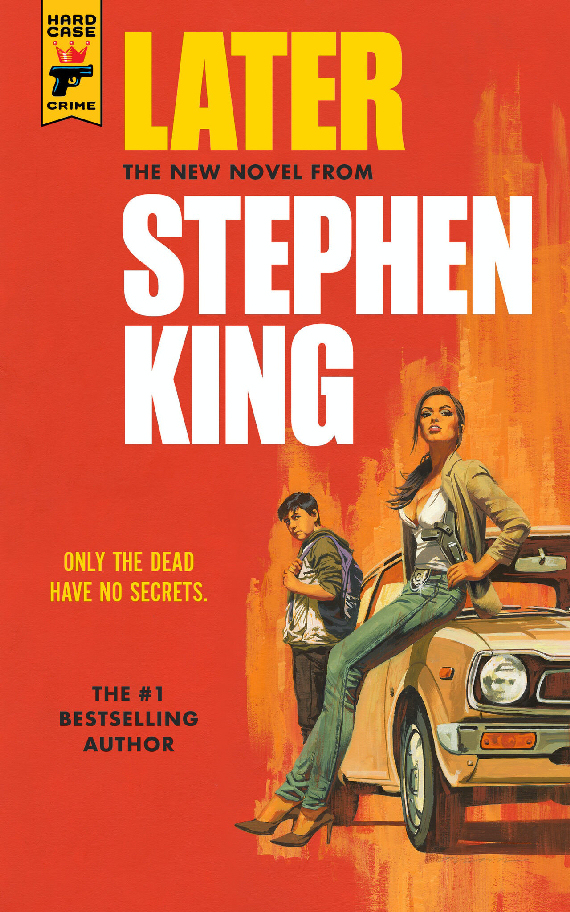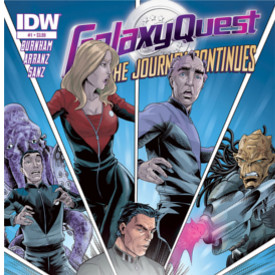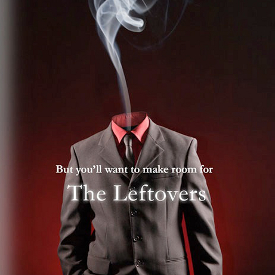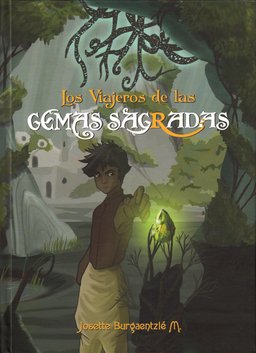
By now you probably know I’m a big fan of “Big Steve” Stephen King. Only met him one time, at Norwescon back in about 1978, before he was a Really Big Name. I had just received my review copy of The Stand from Doubleday, so that’s what I took with me to have him sign (which he did). Had I known then what I know now, I would have found a first edition of Carrie and taken that. Although I later sold The Stand when I was seriously unemployed, that Carrie would have brought three times the money. Which proves I’m no prophet.
Anyway, we’re here to talk about Later, which came out March 2, I believe, under the Hard Case Crime imprint, which is a division of Titan Books. This is the third King Hard Case book, the others being Joyland and The Colorado Kid. As far as I can remember, there hasn’t been a King book that I haven’t liked and enjoyed, so you can guess already I’m not going to be trashing Later. And I don’t want to spoil your enjoyment, so I’ll try to keep the spoilers to minor ones, which means it’ll be a fairly short review. Later (no pun intended) I’ll probably reread it and post a more comprehensive spoiler-laden review.

King either likes young people a lot, or he very early realized that a young protagonist will both hold the reader’s interest and engender a certain sympathy within the reader for a young protagonist. (Unless said reader’s a grinch of sorts.) King used that sympathy to cause most readers to have a cognitive dissonance when the protagonist of “Apt Pupil” turned out to be not exactly a stellar personage, despite being a young person. That excellent novella (from the Different Seasons collection) was made into a not-as-good movie (but isn’t that the case with most screen adaptations of King’s writing?) starring Ian McKellan and Brad Renfro. The absolute best screen adaptation of a King work to date, in my less-than-humble opinion, has been The Outsider, from HBO. But upcoming adaptations include Lisey’s Story, The Talisman (written by King and Peter Straub), The Institute, and others, so filmmakers from HBO to Netflix to Apple TV have a chance to match The Outsider. I don’t think they will; at least one will be as dismal an adaptation as The Dark Tower was (and that wasn’t Idris Elba’s fault!).
Okay, here’s the setup: when the book—it’s kind of a slim volume—opens, we meet our protagonist, Jamie Conklin, who’s twenty-two years old, and he tells us about what “later” means; he tells us a bit about his mother, and how once upon a time he drew a turkey for Thanksgiving that he thought was the cat’s ass. Then we turn the page and find out what he’s talking about. The book jumps between “now,” when Jamie’s six, and “later,” when he’s older. But six-year-old Jamie has a secret that he hasn’t even told his mother: he sees dead people. “Later Jamie” rushes to tell us it’s not like Haley Joel Osment in The Sixth Sense; he only sees people who are recently dead, then they fade away. And here’s something else important about dead people: they can’t lie in answer to a question. They can spontaneously lie; they can try to fool you by saying something that’s not true, but not in answer to a question; they can’t answer with a lie. And if they don’t want to answer—well, here’s a pivotal part of the book, which you’ll learn about when you read it.
Jamie lives with his mother, Tia, in a somewhat upscale older building on Park Avenue in New York; she is a literary agent with an agency on Madison Avenue whose biggest client is the the best-selling writer Regis Thomas, whose books about Roanoke have made him rich and would have made Jamie’s mother—a single mother—rich too, if she hadn’t followed her brother’s advice and poured most of their money into a Ponzi scheme. Uncle Harry founded the agency, but is now in a home thanks to Early Onset Alzheimer’s.
She should have listened to her lawyer, said her lover, a New York City detective named Liz Dutton. And 2009 proves to be the worst year for Tia and the agency, because her best newest client proves to be a flash in the pan, and her sole asset after that is Regis Thomas, who drops dead. Also, Tia’s wisdom teeth become infected, she finds out the Mackenzie fund is a Ponzi scheme, and she has to kick her lover out of their lives because she’s a) a dirty cop; and b) a drug user. So there they are: shit creek, canoe, paddle, you know the rest.
But Tia has an ace in the hole—Liz does too, but she doesn’t realize it till later—in the person of Jamie, who she thought at one time might be cuckoo, till he proved it by telling things only a dead person would know. You guys are smart; you can figure out the first part by yourselves. Here I’ll stop describing the book, because I promised only minor spoilers.
Again King uses a youthful protagonist in a significant way. Jamie’s whole character is shaped by his mother, an unmarried lesbian living a lifestyle she can’t afford through no real fault of her own. He, like most kids, adopts a lot of her habits (the swearing is one), her attitudes, and so on, but he’s definitely his own person. A little bit of his character is formed by his interactions with the dead ones; he learns a bit from his schoolmates and Liz Dutton.
King’s strength for me is that he can take what appears to be an ordinary, everyday life or situation that most anyone can empathize with and, like here, turn it all hellish (or hellacious). From the mundane we get to the totally outré in one or two really easy steps, and before we know it, we’re like the hobbits fleeing from the Balrog, with no Gandalf to yell “You shall not pass!” I love that about his writing. I like being eased into a graphic and/or gory situation with no warning; and usually, the protagonists we’re reading about have us right there with them—finding a body, getting thinner every day, running from cellphone users, or tied to a bed by Annie Wilkes.
I enjoyed this book a lot; I get a kick out of each new situation King puts us in; each horror he springs on us, and the way each protagonist resolves (often with outside help) their dilemma. I might actually reread this one again very soon.
Comments are welcome. Comment here or on Facebook. Your comments, good or bad, positive or negative, are welcome! (But remember, although I want to hear your opinion, I won’t necessarily agree with it!) My opinion is, as always, my own, and doesn’t necessarily reflect the views of Amazing Stories or its owner, editor, publisher or other columnists. See you next time!
Steve has been an active fan since the 1970s, when he founded the Palouse Empire Science Fiction Association and the more-or-less late MosCon in Pullman, WA and Moscow, ID, though he started reading SF/F in the early-to-mid 1950s, when he was just a sprat. He moved to Canada in 1985 and quickly became involved with Canadian cons, including ConText (’89 and ’81) and VCON. He’s published a couple of books and a number of short stories, and has collaborated with his two-time Aurora-winning wife Lynne Taylor Fahnestalk on a number of art projects. As of this writing he’s the proofreader for R. Graeme Cameron’s Polar Borealis and Polar Starlight publications. He’s been writing for Amazing Stories off and on since the early 1980s. His column can be found on Amazing Stories most Fridays.










Recent Comments